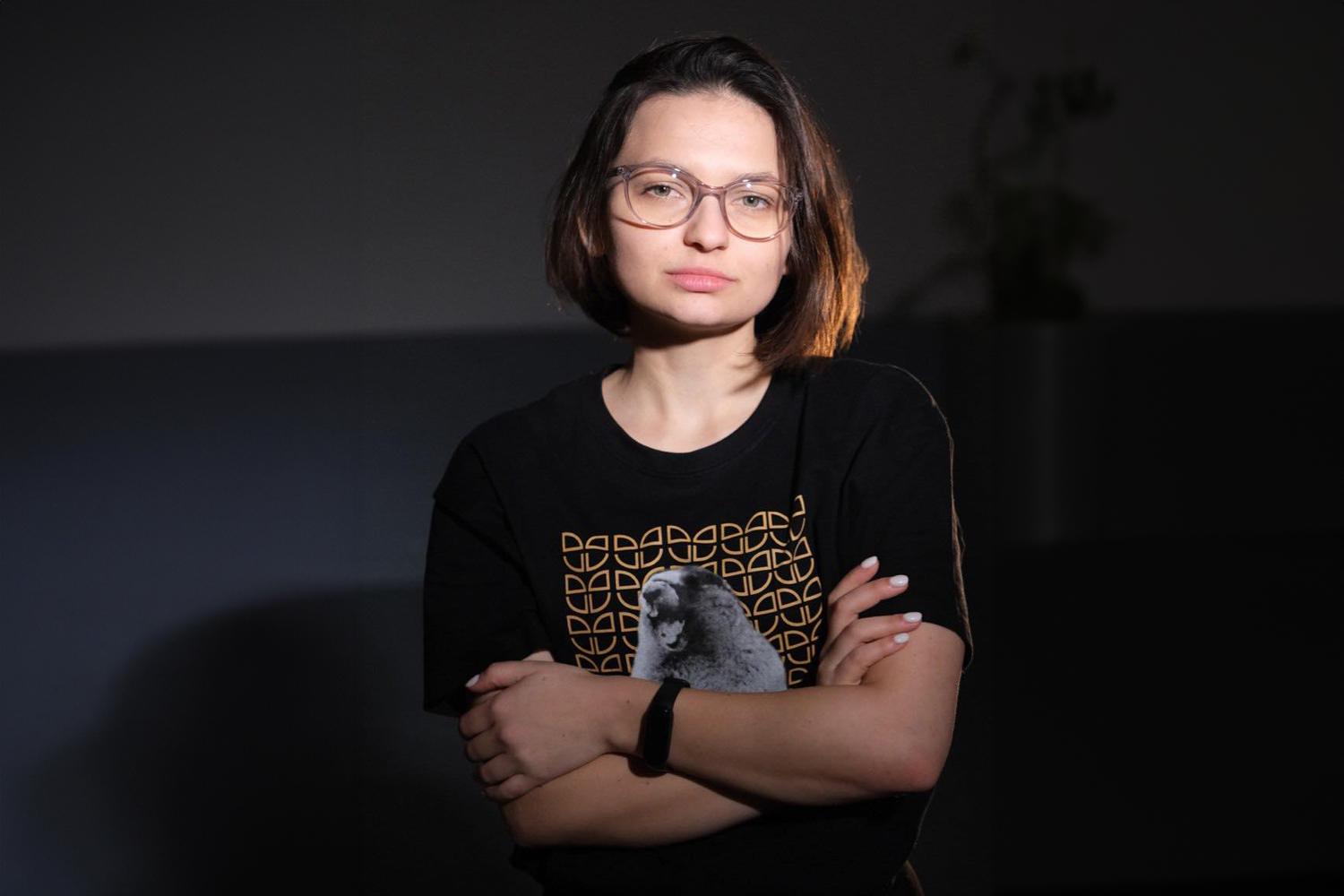
The Voices of Occupation are a collection of stories from people in Ukraine’s east and south who survived Russian occupation and successfully evacuated. Two and a half years into the full-scale war, Ukraїner stays in touch with its heroes, sharing how their lives and perspectives have changed over time.
This piece continues the story of Yuliia Naidysh — a screenwriter, media specialist, and volunteer at Ukraїner who fled the Russian-occupied village of Yevsuh in the east of Ukraine.
About five years preceding the full-scale war, Yuliia split her time between two places. She rented an apartment in Kyiv, where she worked as a screenwriter, and travelled to Yevsuh to see her family and help run a small family business — a mini-incubation station for up to 10,000 chickens, funded by a grant she won in 2019. In the autumn of 2021, Yuliia returned to Yevsuh, planning to stay for a few months before heading back to Kyiv in February. However, the plans have changed: on 22 February, 2022, (two days before the full-scale invasion of Ukraine – ed.) Putin declared that Russia would recognise the self-proclaimed Donetsk and Luhansk People’s Republics. Within the first days of the following invasion, Yevsuh fell under Russian occupation.
The distance between Yevsuh to the demarcation line between Ukraine-controlled territory and the previously occupied areas is approximately 80–90 kilometres (50–56 miles – ed.), making locals accustomed to the realities of war since 2014. However, after the full-scale invasion broke out on 24 February, 2022, people didn’t rush to leave the village, much to Yuliia’s surprise. Many reassured themselves with the fact that Nazi troops failed to reach their area during World War II. Yuliia, instead, was overwhelmed with panic and hastily packed her suitcase, even though she had no clear plan or destination.
The Donetsk and Luhansk People’s Republics
unrecognised quasi-state entities, declared on the territories of Ukraine’s Donetsk and Luhansk regions following their Russian-backed occupation in 2014
Throughout most of March, Yuliia stayed inside her house to avoid Russian soldiers and potential collaborators. She relied on the United News telethon for objective information, as the nearest internet provider with a weak connection was 30 kilometres (roughly 18 miles – ed.) away. Yuliia admits that in moments of despair, she thought that if she failed to escape the occupation, she would intentionally head to the front lines to be killed.
At the end of April, Yuliia evacuated through Russian territory. During the filtration process, she pretended to be a local girl from the village travelling to see her relatives in Russia. After arriving in Latvia (Russian-neighbouring states are common destinations for Ukrainians fleeing occupation, as Russia blocks their passage through the Ukrainian border – ed.), she engaged in activism, calling to remove Russian propaganda literature from local bookstores and attending rallies in support of Azovstal defenders.
United News
a nationwide joint informational telethon launched in Ukraine on the onset of the full-scale war to provide the public with timely updates on the security situation and the actions of state authorities.Filtration
a violent, unregulated scrutiny conducted by Russian-established authorities in occupied territories to assess the loyalty of the population by examining their personal data, social contacts, and attitudes towards Russia.Azovstal
a steel plant in Mariupol that sheltered Ukrainian troops and over 1,000 civilians at the start of the full-scale invasion. Ukrainian forces defended the besieged plant for over a month before being driven into Russian-controlled territories in mid-May 2022, where many remain captive.
Learning to trust again
Yuliia returned to Kyiv from Latvia in mid-July 2022. The woman felt she was starting a new life, despite having lived in the capital for about five years before the all-out war broke out. She chose to cut ties with some people, while others ended relationships on their own. Her old acquaintances who remained in Kyiv throughout the initial stage of war had different perspectives and life experiences. Yuliia also noted that after the occupation and leaving the country, she found it harder to trust people. She felt more secure communicating with colleagues from the Toronto Television project, a well-known Ukrainian satirical journalism show. Even while in occupation, Yuliia stayed in touch with them and contributed to their video production.
“Then I met Ukraїner. I learned to open up again because Ukraїner is a community where values bring people together. In this environment, you feel safe to be yourself and connect with others. It’s a place of a balanced exchange of emotions and support, where you both give and receive back.”

As a scriptwriter for Ukraїner, Yuliia started working on projects that delve into the experience of occupation and the reclamation of Ukrainian identity. Among her most meaningful projects are the Brave Cities series, telling the stories of Ukrainian cities under occupation, and the documentary Return to the Ukrainian Language, featuring the stories of Russified Ukrainians who switched back to their native tongue:
“They [the projects] became very therapeutic for me,” she said. “I processed the traumas of occupation and Russian assimilation. Writing these scripts allowed me to grow and develop, helping me to reach the place where I am free from it all.”
Yuliia shares that initially, she sought comfort from people who had also endured occupation or were forced to leave their homes, believing they would understand and be able to provide support. However, she later realised the importance of sharing her experiences with Ukrainians who were not familiar with the realities of occupation:
“Speaking with people who hadn’t been through similar experiences was helpful to me. They filled me with new energy, it wasn’t just this endless exchange of pain. For a time, I did isolate myself from those who had similar experiences because I didn’t know how to talk to them.”

As Yuliia processed her trauma and gained a deeper self-awareness, she found support not only through new connections but also through psychotherapy. For those who can’t afford therapy, she suggests looking for free apps or programs offering assistance. She also shares that she runs and meditates daily, having recently discovered how closely emotions and physical well-being are linked — improving one helps elevate the other:
“There’s a meditation app called Svitlo, where you log in and it asks what emotion you’re feeling, offering a list to choose from. You read through this list and think, ‘There are so many emotions in the world and they all have names!’ Identifying what you’re feeling is helpful because awareness is key. Once you realise what’s happening, it becomes easier to accept and process these emotions.”
The feeling of home: reeds, tomatoes, and renovations
After evacuation from Yevsuh, Yuliia spent almost a year and a half coming to terms with the reality that she could no longer return home. Initially, she ignored it, later switched to denial and refused to believe it, convincing herself she had been there recently and could still go back. Her emotional turmoil was aggravated by news of the 2022 counter-offensives and the liberation of territories in mainland Tavria:
“The hardest times were when counter-offensives occurred one after another. There was this feeling that our towns (in the east) would soon be liberated. This feeling lasted for about three months, and it was terrifying. It feels like you’re not living your life, but just waiting for a counter-offensive to reach your area.”
By early 2023, Yuliia had come to terms with her longing for home. She admits it took her a while to figure out how to create a sense of comfort, especially being dozens of kilometres away from her native village. Additionally, she was living alone for the first time, having separated from her boyfriend shortly before the full-scale invasion.
“At first, I realised that reeds [made me feel at home], because we had them growing everywhere, and I kept some in a vase. Initially, I started looking for these reeds in Kyiv during winter. Then I posted it online, and people started giving them to me. It helped a bit, but not much,” Yuliia says.

At that time, Yuliia had an open balcony where she decided to grow plants that reminded her of home. She visited the urban market with her acquaintance, also from Starobilsk (a community in Luhansk region Yuliia’s village belongs to – ed.), to search for tomato seedlings.
“I felt so at home at that market. For me, tomatoes, roses, and spruce trees are symbols of home, so I went there and talked to all the vendors. I researched how to make them grow on my balcony and was incredibly inspired! It was so fascinating and wonderful! I brought back tomato seedlings, cucumber seedlings, and even soil, which felt odd to me. In our village, we never buy soil to plant tomatoes,” she recalls.

Through gardening, Yuliia got to know her neighbours better, especially the older women who frequently grow vegetables and flowers, as well as the security guard who has a country house. She recalls gathering with them to discuss things like whether it’s worth fertilising plants with chicken manure. The process of growing tomatoes also brought Yuliia closer to her family:
“Then I reconnected with my relatives because planting those tomatoes made it important for them to thrive and bear fruit. I would call [a relative] from the middle of Kyiv, asking ‘I’m bringing seedlings. Tell me what should I do?’ It brought us closer together and took me back to a childlike, carefree state, where I was focused solely on planting seedlings.”
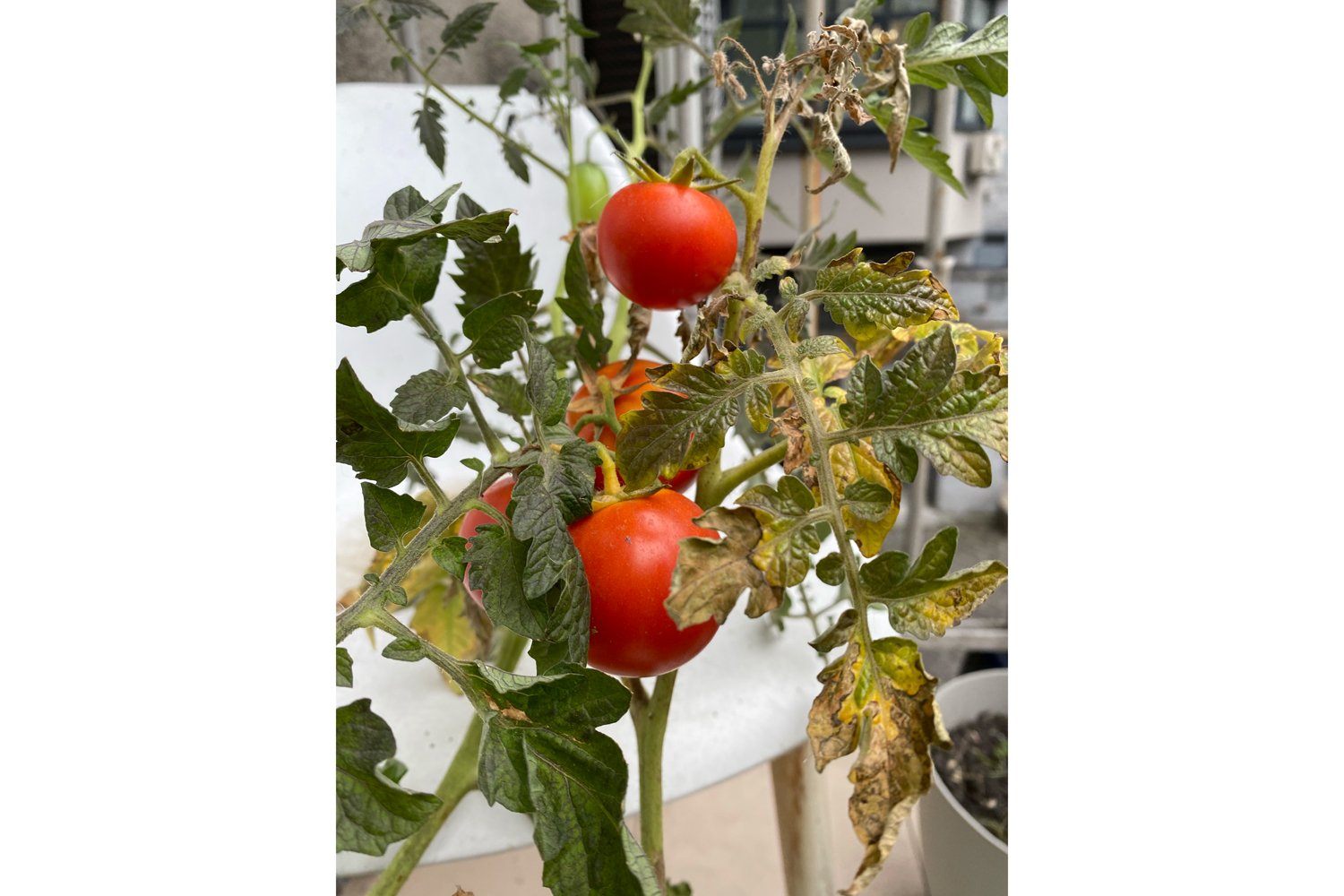
Yuliia still takes great pride in her first harvest of Kyiv tomatoes. However, she didn’t stop there — she felt that while plants helped her feel better, it wasn’t enough. She decided to renovate her apartment to interact with the space around her better. From late August to November 2023, Yuliia learned to work with tools, bought building materials, removed mould, patched and painted the walls with the help of her friends. She shared reflections, successes, and challenges on her Instagram, turning the renovation journey into an almost daily feature.
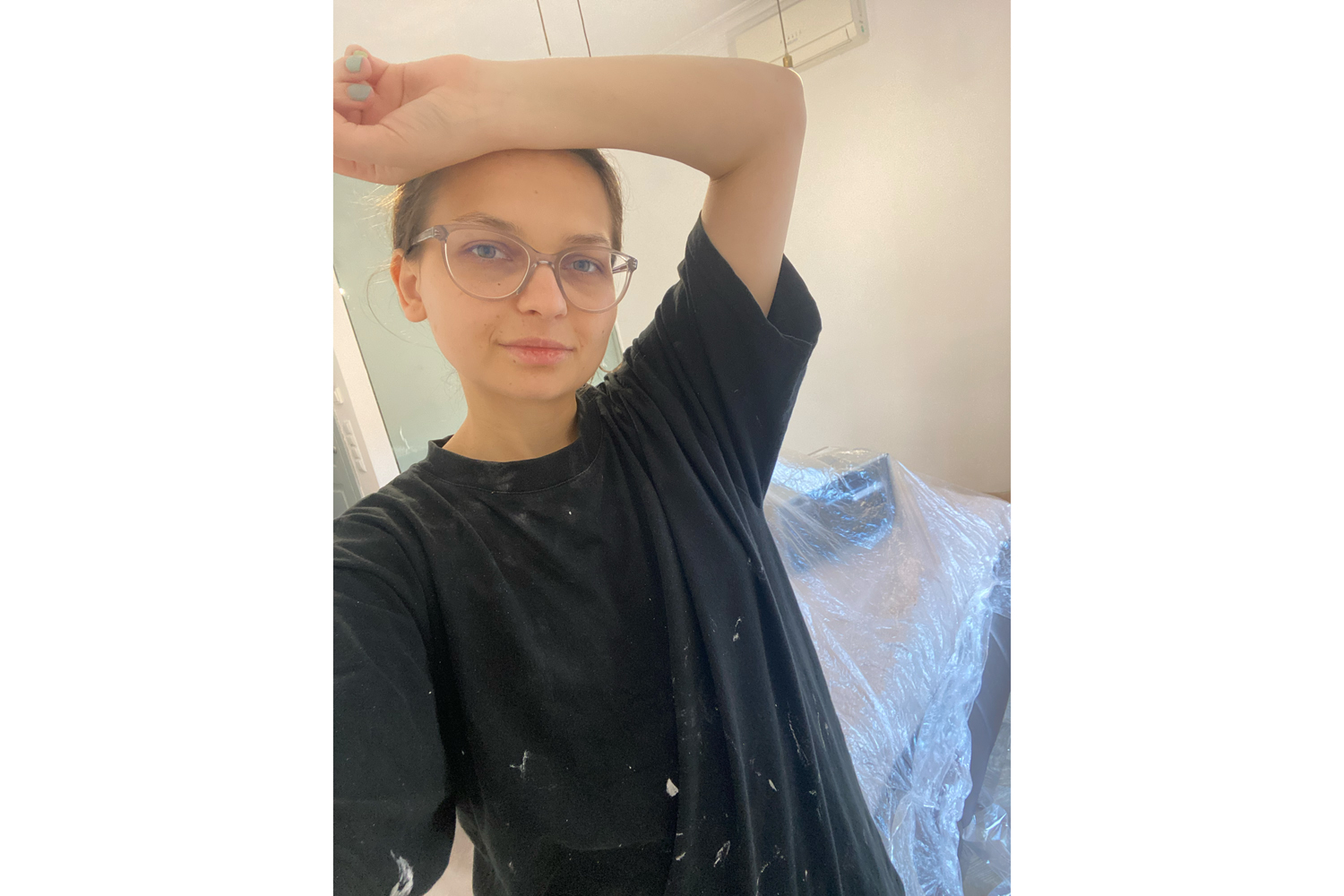
On the final day of renovating her apartment, Yuliia learned that the owner planned to sell the property, requiring her to move out within six months. Despite the news, she wasn’t saddened much. She believes that if she had stayed longer, she would have grown bored and had to consider a new place:
“So much has happened here, and I want to leave behind all of that difficult period of adaptation after the occupation and evacuation. It feels like a closed chapter. I’ve told myself that I’ll move to a new apartment, leaving the burden of old memories and traumas behind.”
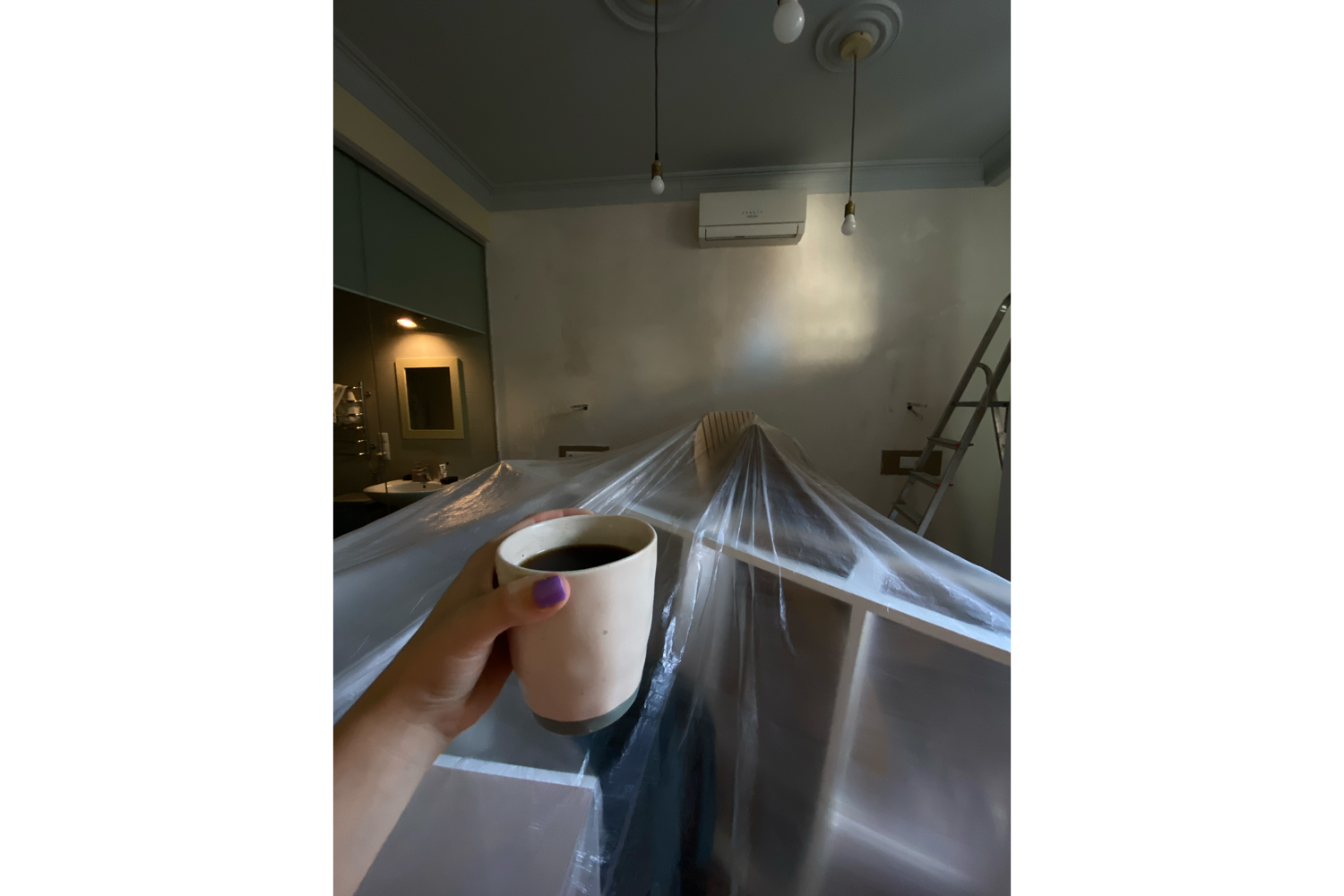
Supporting Ukraine’s east
Currently, Yuliia lives in a new apartment. She feels that she has sufficiently recovered and is ready to dive into new ideas and projects:
“For the past two years, while everyone was fighting, I was working through my trauma. Now, as I see people growing tired and burning out, I feel it’s my time to step up. I can take on some responsibilities, and I’m already doing so, particularly in media work, to give others a chance to rest.”
At the beginning of 2024, Yuliia completed a book she had started while under occupation. During that time, she extensively used her phone notes to reflect on the two Russian invasions in 2014 and 2022, her life under occupation, the influence of Russification, and the way she overcame it. Her consistent work on the manuscript was fueled by winning a competition held by the Litosvita School of Creative Writing. Out of other applicants who described their project ideas and motivations, the jury selected three people, granting them a spot to attend all the project’s courses during a year. With the support of mentors and fellow participants, Yuliia organised her notes in a book titled How to Kill the Little Russian in Yourself: A Confession, and has already sent the updated manuscript to publishers.
“Little Russians”
is a derogatory term from Russian colonial discourse that labels Ukrainians as an inferior variant of “Great Russians” (ethnic Russians), denying them a distinct cultural identity and political autonomy.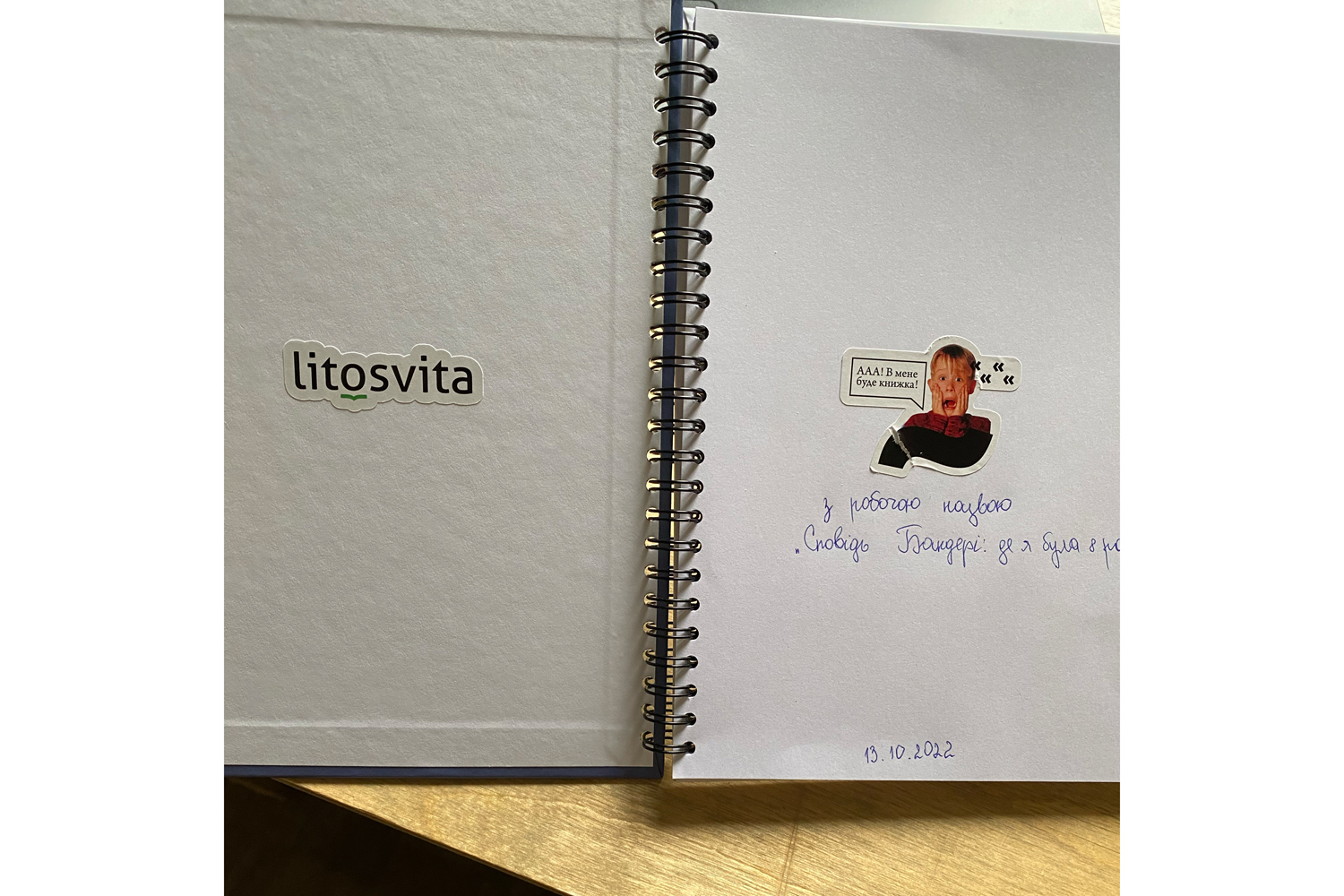
At the end of her work on the manuscript, Yuliia travelled abroad for the first time since the summer of 2022, winning a spot at a creative residency in Przemyśl, Poland. She was taken aback by the calm demeanour of some Ukrainians travelling to another country:
“I was surprised and a bit concerned by their calmness. They were travelling abroad as if it were a second home, and I wondered if it might become an issue for us later. Some are studying, some are living there, and many of them are women and children.”
In the foreign environment, Yuliia was aided by fellow residents who spoke Polish and communicated with the locals. She said she learned a few basic phrases but felt a bit shy speaking with Polish people. As a result, she either stayed silent during conversations with other residents or spoke in Ukrainian, as Przemyśl hosts many Ukrainians or people who understand basic phrases.
Even after arriving in another country, Yuliia reacted to familiar sights and sounds in ways shaped by her experiences during the full-scale invasion. For instance, the sounds of nearby construction reminded her of air defence operations and explosions, and the freedom to go outside at night felt like breaking the law, as she was accustomed to curfews in Ukraine during that time:
“I receive air raid alert notifications. Even though you’re 50 kilometres [30 miles] or more away from Ukraine, you feel safe, but that sense of safety is unsettling because you know Ukraine is still in danger. Your family and friends are at risk. What scares me most is how quickly you can become detached from the terrible news. While I was here, there were attacks, and it felt as if they were happening somewhere else. But in reality, it’s happening in my country, to which I will soon return.”

A significant part of Yuliia’s current media work involves serving as an intermediary between Ukrainians from the east and other regions. To combat stereotypes and prejudices, she launched the Wild East project, aiming to create a fact-based positive image of Ukrainians from Donechchyna. To determine the most relevant content, Yuliia and her team rely on the results of a self-initiated survey Study of the Media Content Needs of Residents of Luhansk and Donetsk regions.

In addition to engaging in dialogue with Ukrainians from other parts of the country, Yuliia strives to spread truthful news about Ukraine to residents of the Russian-occupied east of the country. Due to the information isolation imposed by Russia, many of these residents have a distorted view of reality.
Despite the persecution of Ukrainians by the occupation authorities, Yuliia finds inspiration in how the people from her homeland express support for Ukraine in various ways—some on the front lines, others in the rear.
“I often reassure acquaintances in the occupied territories that when Ukraine returns, nothing will happen to them; only collaborators will be punished. Those who were doing regular jobs have nothing to fear, and my confidence in this reassures them — they believe me. I also enjoy telling my relatives in the occupied territories about meeting new people, making friends, creating things, and I highlight where these people are from. I emphasise that Ukraine has many great people and I believe this has its impact,” she says.

